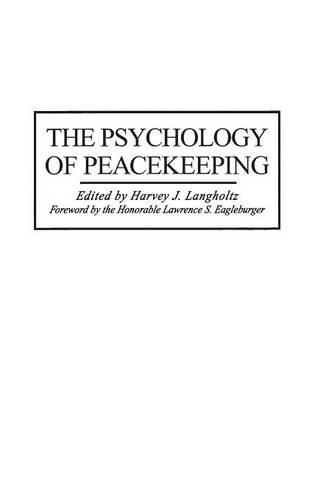
The Psychology of Peacekeeping
(Hardback)
Publishing Details
The Psychology of Peacekeeping
By (Author) Harvey Langholtz
Bloomsbury Publishing PLC
Praeger Publishers Inc
27th August 1998
United States
Classifications
Tertiary Education
Non Fiction
Psychological theory, systems, schools and viewpoints
International relations
327.172019
Physical Properties
Hardback
280
Description
Langholtz examines how psychology and other social sciences can offer both theoretical explanations and practical applications in the resolution and amelioration of potentially violent international conflicts. Since the end of the Cold War and bipolar ideologies, the international community has been willing to intervene using approaches that are founded as much in psychology as in force and these remedies have not been confined to the violent periods of conflicts. This book examines psychological interventions and issues during three phases of conflicts. First, the book examines measures available in advance of a threatening conflict through early intervention and an examination of ethnopolitical issues, economic problems, and potential diplomatic solutions. Second, psychological facets of peacekeeping are examined: the selection of peacekeepers, psychological ambiguities of peacekeeping, and the numbing that comes with widespread suffering. Finally the book examines the psychological measures available to strengthen a cease-fire, deal with mines and related after-effects of war, encourage reconciliation, and hasten the return to a stable and durable peace.
Reviews
The Psychology of Peacekeeping contains a number of potentially useful ideas and concepts that range from the parties listening to one another to applying lessons from experience to contributions to increased trust and to less mistrust between them.-Contemporary Psychology
This edited volume gives new importance to the psychological factors that can lead to armed conflict and durable peace, as well as the necessary role of psychology in addressing modern-day conflicts.-Journal of Nervous and Mental Disease
"This edited volume gives new importance to the psychological factors that can lead to armed conflict and durable peace, as well as the necessary role of psychology in addressing modern-day conflicts."-Journal of Nervous and Mental Disease
"The Psychology of Peacekeeping contains a number of potentially useful ideas and concepts that range from the parties listening to one another to applying lessons from experience to contributions to increased trust and to less mistrust between them."-Contemporary Psychology
Author Bio
HARVEY J. LANGHOLTZ is Assistant Professor of Psychology at The College of William and Mary in Williamsburg, Virginia. He has served as a member of the United States Delegation to the United Nations and has been appointed a Senior Special Fellow of the United Nations Institute for Training and Research.
